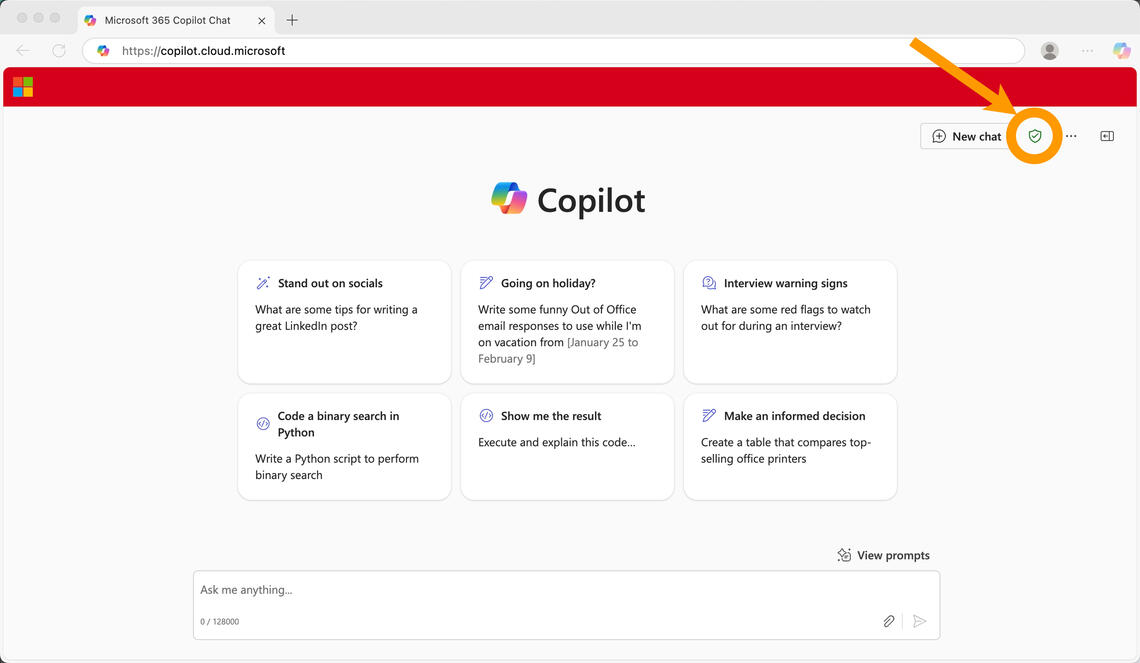Earth, Energy, and Environment
Microsoft Copilot
Copilot Chat is a generative artificial intelligence (AI) tool created by Microsoft. It can be used to brainstorm and get answers to questions, organize and summarize documents and generate text, images and more. UCalgary recommends Microsoft Copilot over ChatGPT because using the secure version of Microsoft Copilot Chat offers better security, privacy and protection of data. It also complies with UCalgary policies and standards.
A secure version is available for anyone with a UCalgary IT account. To keep your data protected, you must sign in using your UCalgary credentials. You’ll know you’re using the secure version if you see the green shield (see images below). With the secure version of Microsoft Copilot Chat, you can safely enter level 1, 2 or 3 information.
Copilot Chat website: the green shield means you are using the secure version

Scholarly AI Tools
The following list includes AI tools better suited for academic work:
- Scite.ai - An AI citation analysis tool that utilizes smart citations to support scholarly research. The University of Calgary has an institutional licence for this tool.
- Scopus AI is Elsevier’s generative AI-powered research assistant that synthesizes trusted, peer-reviewed content from the extensive Scopus database, offering referenced summaries, concept maps, and emerging themes to help researchers explore topics. It is accessible through the Scopus platform, and is available in the main search box within Scopus.
These are not monitored or supported by the library, but can be helpful for research.
- ResearchRabbit - ResearchRabbit allows users to input articles into collections to allow users to search for related papers.
- Consensus - Consensus is an AI-powered search engine which utilizes Semantic Scholar for its searches, sourcing whatever research it uses in its summaries.
- Undermind - An AI-powered scientific research support tool which draws from Semantic Scholar to provide users with summaries of scholarly works.
- Elicit - Elicit is an AI-powered research tool that searches Semantic Scholar that can assist users with literature reviews.
What is Chat GPT?
ChatGPT is large language model tool that uses artificial intelligence and natural language processing to answer user-generated prompts. It was developed by OpenAI and is currently freely available for public use.
There have been imitators of ChatGPT since it has been in the news. The correct link for it is: https://chat.openai.com/auth/login
ChatGPT Privacy & Terms of Condition
Understanding the privacy policies and terms of use of software and AI tools we commonly use is important, as they explain what information is collected, why they collected that information, how that information will be used (both in the present and the future), and how they will or will not protect that private information. In ChatGPT's case:
- OpenAI's privacy policy allows them to share your data with third-party vendors, law enforcement, and other users.
- What is put into this software is not private.
- Their Terms of Use state "you must be 18 years or older and able to form a binding contract with OpenAI to use the Services".
- These Terms state that users must not "represent that output from the Services was human-generated when it is not".
- What information gained from ChatGPT and OpenAI must be shared as from ChatGPT and OpenAI. Meaning if it is used it a paper, it must be stated as from their services and not human generated.
- Users are responsible for the Content generated "ensuring it does not violate any applicable laws or these Terms."
- While you can delete your ChatGPT account and no longer use it, your prompts and questions belong to OpenAI and become a part of the company’s collected data.
ChatGPT Common Browser Extensions
-
ChatGPT for Search EnginesAccess the ChatGPT model from your search engine results to ask any question and get a natural language response. Available for Firefox, Edge, & Chrome.
-
GPTZeroGPTZero uses the technologies used to build ChatGPT to detect AI. It uses variables like perplexity to fingerprint AI involvement.
-
WebChatGPTThis extension adds web results to your prompts to ChatGPT.
ChatGPT & Similar AI Articles
- Last Updated: Sep 5, 2025 8:25 AM
- URL: https://libguides.ucalgary.ca/geoscience
- Print Page
